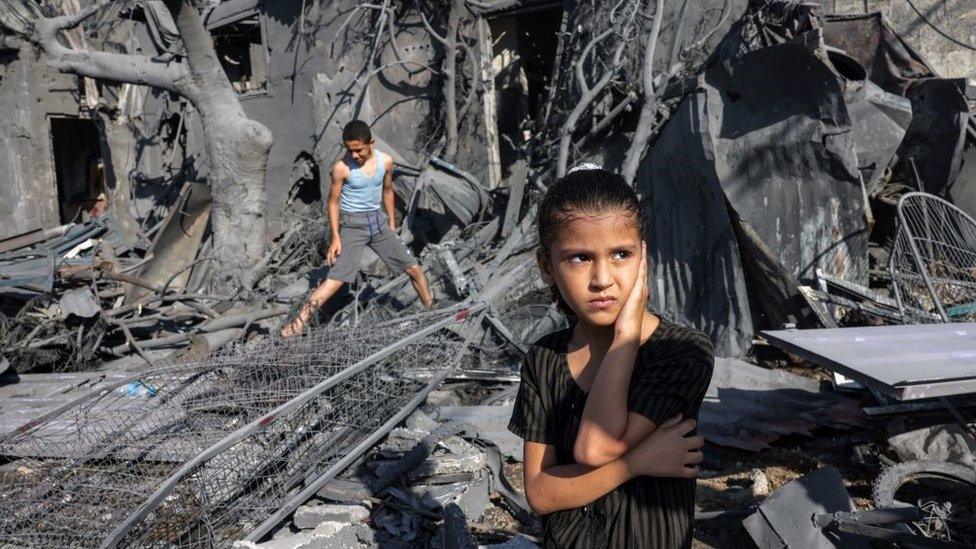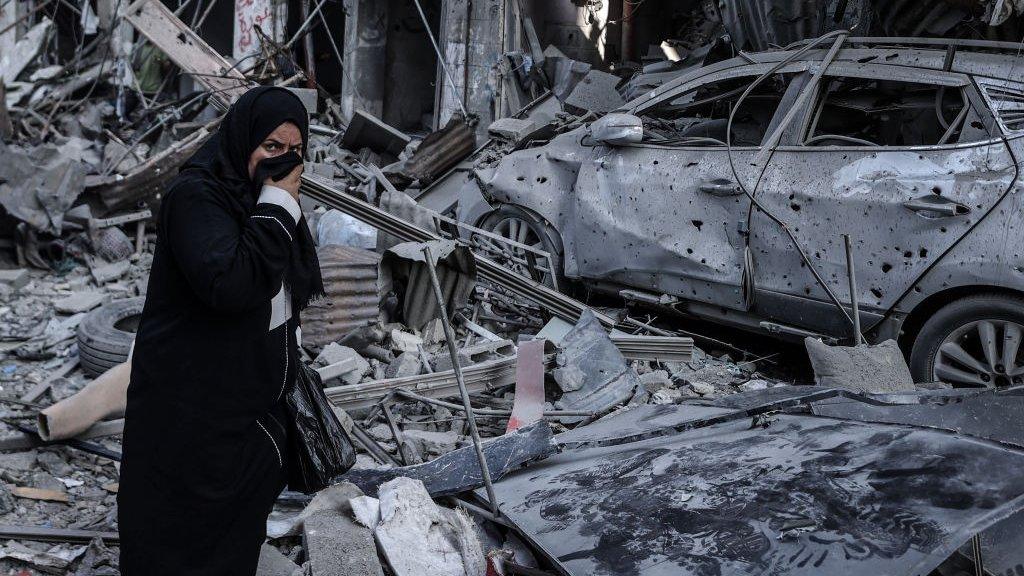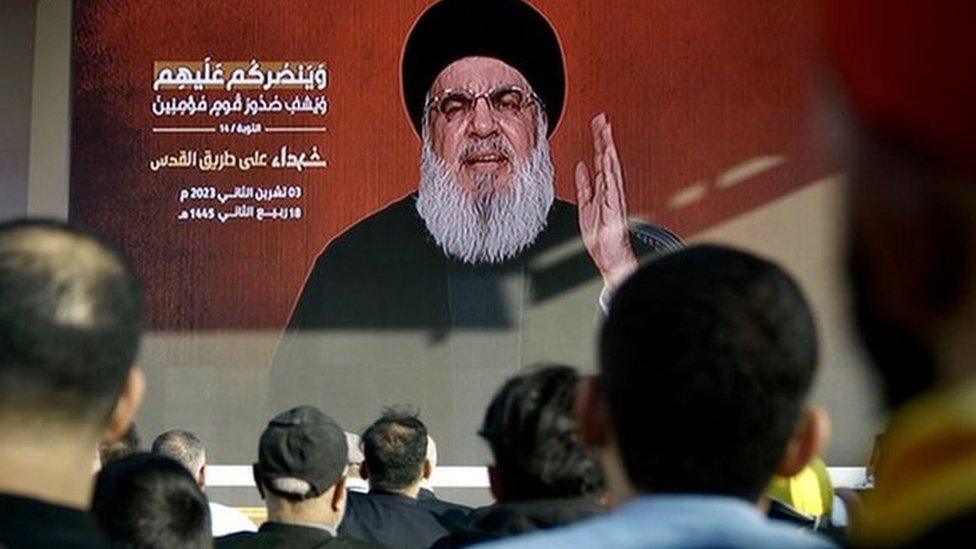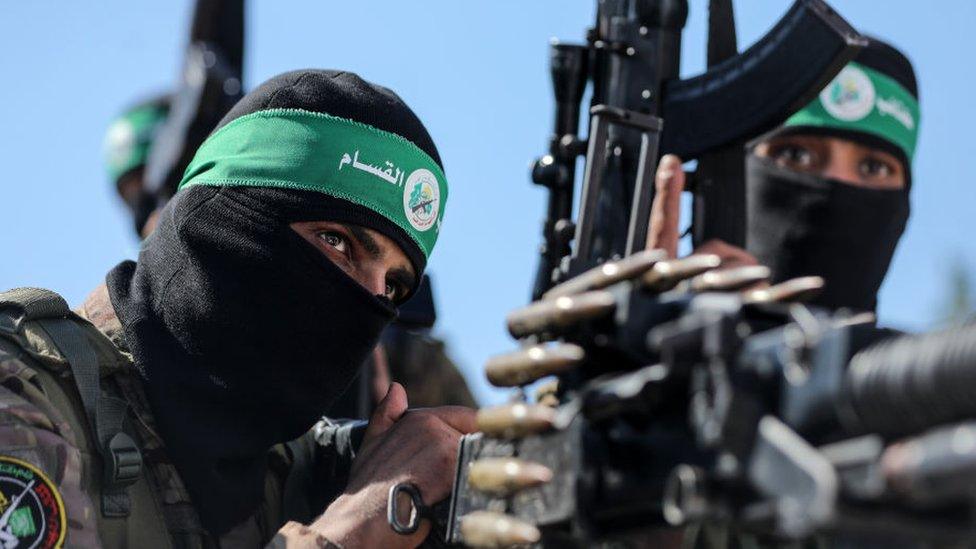Israel Gaza war: Hamas-run health ministry says Gaza death toll passes 10,000
- Published

The Hamas-run health ministry in Gaza says more than 10,000 people have been killed in the Palestinian territory since Israel started bombing it last month.
More than 4,000 of those killed were children, the ministry said.
The number surpasses the UN's figure of about 5,400 killed in Gaza in all of Israel's previous conflicts with Hamas since it took control of the territory in 2007.
Israel began bombing Gaza after Hamas killed 1,400 people and kidnapped more than 200 others on 7 October.
It says it is destroying Hamas infrastructure and killing its fighters so that it will no longer be able to pose a threat to Israel.
US President Joe Biden has previously questioned the accuracy of the health ministry's figures, while the Israel Defense Forces (IDF) say that "any information provided by a terrorist organisation should be viewed with caution".
Hamas is a proscribed terror organisation in many countries including the UK and US.
However, World Health Organization (WHO) regional emergency director Richard Brennan, based in Cairo, said last week he believed the figures provided by the health ministry were trustworthy.
"We're confident that the information management systems that the ministry of health has put in place over the years stand up to analysis," he said, adding "the data over the years has been quite solid".
On Sunday night, the Israeli military carried out one of its heaviest bombardments of the besieged Gaza Strip, saying on Monday that it had hit 450 targets over the past 24 hours.
The Hamas-run health ministry said "more than 200 martyrs were reported in the overnight massacres".
The director of Al-Shifa hospital in Gaza City told the BBC that people were using donkeys and their own cars to carry dead bodies, because communications had been cut and they could not reach ambulance services.
The Palestine Red Crescent Society (PRCS) charity said this was the "third communications blackout" in Gaza since the war began - and it had lost contact with its teams.
Communications were restored on Monday morning, but getting information from Gaza City remains difficult.
The Israeli military says its troops have reached the coastline in the south of Gaza City, in effect dividing the territory in two.
The heads of all major UN agencies have issued a rare joint statement calling for an "immediate humanitarian ceasefire", saying "enough is enough".
"For almost a month, the world has been watching the unfolding situation in Israel and the occupied Palestinian territory in shock and horror at the spiralling numbers of lives lost and torn apart," the UN chiefs wrote.
The BBC's Rushdi Abualouf on the scene of the damage at the al-Maghazi refugee camp
The heads of organisations including Unicef, the WHO and the World Food Programme - as well as charities such as Save the Children - have described the "horrific" loss of life on both sides. They have also released a statement to demand the unconditional release of the hostages taken by Hamas during its 7 October attacks.
"However, the horrific killings of even more civilians in Gaza is an outrage, as is cutting off 2.2 million Palestinians from food, water, medicine, electricity and fuel."
The statement added that 88 people working for UNRWA, the agency focused on Palestinian refugees, had been killed since 7 October - representing the highest number of UN fatalities ever recorded in a single conflict.
The UN - which is housing many of the 1.5 million displaced Gazans - says 48 of its sites across the Gaza Strip have been damaged since the war broke out.
Israel has rejected the idea of a ceasefire - for which its Arab neighbours have also been calling - and for a humanitarian pause, which is the solution favoured by its ally, the United States.
At the weekend, Mr Netanyahu said Israel rejected "a temporary ceasefire that does not include the release of our hostages" in a TV statement, minutes after a call with US Secretary of State Antony Blinken.
He said that Israel was "continuing with all our force" against Hamas.

More on Israel-Gaza war
Follow live: Latest updates
Analysis: Jeremy Bowen's five new realities after four weeks of war
From Gaza: Stories of those killed in Gaza
History behind the story: The Israel-Palestinian conflict
- Published4 November 2023

- Published3 November 2023

